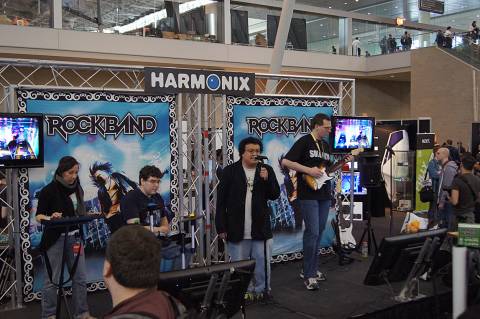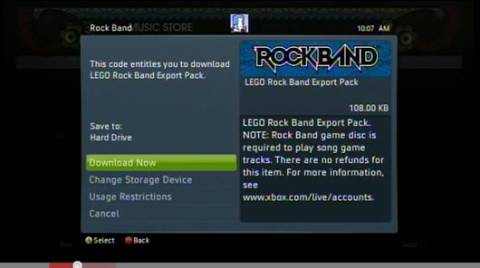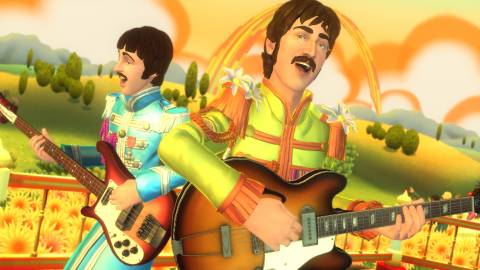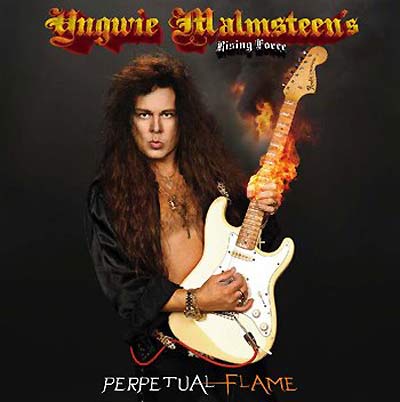The end of a console generation is nearly upon us, and with that comes the usual house-cleaning and refocusing of resources by various developers and publishers as they prepare for the new volley of hardware that's about to be foisted upon consumers. Most times this kind of cleanup work would be almost entirely behind-the-scenes, but this generation has been a bit different. Game franchises have received more post-release support in the last eight years than they did in any of the previous generations combined. No franchise was more emblematic of that than Rock Band, Harmonix's plastic instrument-rooted music series which has been steadily offering new songs, week after week, for the last five years plus. At a point, I think it became clear to most that this wouldn't go on forever, especially as the plastic instrument genre became less and less of the sales juggernaut it once was. Anyone still paying attention to the weekly Rock Band releases in recent months probably saw this end coming before the announcement was officially made, though that made it sting no less when it inevitably came.

I'll be the first to admit that my connection to the Rock Band franchise is unique. My time at Harmonix is the only experience I've had working on the other side of the industry fence, albeit entirely in a promotional capacity. Still, long before I started working there, I was a fan of this studio, and this genre. Guitar Hero still ranks highly among my most played of PlayStation 2 games, and I'm maybe one of the few knuckleheads who actually bought every piece of Guitar Hero II DLC for Xbox 360. When Rock Band came out, and I had my first opportunity to translate my real-life drumming skills (such as they were) to something related to video games. Rock Band hooked me bad, to the point where not only did I end up acquiring nearly every game in the series, but also downloaded way, way more DLC than I'd ever care to fully admit.
Being there and seeing how the sauce was made didn't diminish my enthusiasm for the series. There were periods where I burned out on it, certainly, but there were as many periods where I'd spend my work day writing press releases or staffing events for Rock Band, then I'd go home and just play more Rock Band. If I'm honest, it bordered on a sickness.
All of that said, I, like most people, began to fall off a bit as the plastic instrument craze waned in popularity. By the time Rock Band 3 came along, people's interest in big, bulky guitar controllers and actual goddamned electronic drumsets that plugged into Xboxes had all but dissipated, hence why RB3 is known mostly for its dismal sales, despite being the most overall "complete" entry in the series. I played a lot of RB3, and had still been buying DLC on semi-regular occasions up to this week, but it was obvious that Harmonix's DLC efforts were down to a few burning embers on the verge of fizzling out entirely. It's too bad, but such is the way of gaming trends like these.
As of this Tuesday, Rock Band DLC support will be done, and so too will end this generation of music games. There is always the possibility Harmonix or Activision could resurrect their dormant music franchises somewhere down the road, but it seems readily apparent that that won't happen for some time, if at all. Instead, Harmonix has focused its efforts on new IPs, as well as its currently successful Dance Central series. This Tuesday, after releasing nearly 1800 DLC songs officially, Rock Band will end not with some giant, explosive big rock ending, but with the solemn, dulcet tones of Don MacLean's "American Pie", a sad but fitting conclusion to Rock Band's five-plus years of musical history curation--or, at least, the pieces of musical history it was able to acquire master tracks for.
Given all these nostalgic feelings I'm having, what say we go back through the last five-or-so years and pick out some of the highlights (and a few of the lowlights) of Rock Band's brief, but memorable existence?
Rock Band as a Platform

Technically speaking, there were only three "official" Rock Band releases. Each game came with its own unique soundtrack, as was custom, but Rock Band was the first series to introduce the concept of cross-title DLC support, as well as the exporting of soundtracks from previous discs. When Rock Band 2 came out, you could essentially "rip" the original RB soundtrack onto your hard drive and play them in your brand-new game. Harmonix had talked early on about how it expected Rock Band to be a platform for music, rather than just a series that put out sequels year-after-year. In truth, it essentially had its cake and ate it too, putting out multiple sequels while maintaining support for nearly every piece of music the studio had released to date. It was kind of a genius move, even if the effort required to keep this going proved to be something bordering on ridiculous.
The main complication, of course, was that songs licensed for release on the game disc had to be re-licensed for disc export, which would usually result in a Metallica song here, or a Black Sabbath cover there, being excised. It's maybe a bit of a shame that not every single song ever released in Rock Band remained playable forever, but considering only a handful of songs ever actually disappeared, I'd say Harmonix closed with a pretty strong batting average, all things considered.
More to the point, it's impressive to me that Harmonix actually made good on a promise that frankly sounded a little nuts all the way back in 2007. Maintaining steady DLC support for a major franchise, while also handling the many different trials of music licensing, music re-licensing, and publishing on platforms owned by Microsoft, Sony, and Nintendo--each of which had their own labyrinthine process--is really quite something. That it managed to do it regularly (without breaks) for 281 straight weeks is frankly insane.
While My Broken Guitar Gently Weeps
There's probably just as much to complain about regarding Rock Band's hardware as there is to praise. Rock Band's early instrument controllers weren't very good. The first guitars had spongy strum bars and stiff guitar necks, and the drums were tragically easy to break. This resulted from Harmonix suddenly having to learn how to become a hardware manufacturer after its previous Guitar Hero partner, RedOctane, joined up with Activision. Harmonix was a software developer suddenly presented the unenviable task of learning how to manufacture plastic instrument controllers, ship them internationally, and somehow find a way to make money in the process. As a result, that first batch of Rock Band hardware is perhaps best forgotten, lest you remind yourself about all the broken kick pedals and chintzy strum bars you had to put up with at the outset.

That said, the hardware got better as the franchise rolled along. Rock Band 2 was a notable improvement, and also introduced the ludicrously large, but not prohibitively expensive Ion Drumkit. By the time The Beatles: Rock Band came along, with its limited edition guitars and far sturdier drums, it was clear Harmonix had figured out this hardware thing. Unfortunately, by the time Rock Band 3 came around, along with its pro-guitar controllers (one of which was an actual fucking guitar) and under-praised keyboard peripheral, people had already largely moved on from the plastic instrument craze. It's a shame, because those were by far some of the best pieces of hardware Harmonix--with the helpful assistance of Mad Catz--ever produced.
Albums vs. Greatest Hits
Rock Band introduced the concept of full albums as DLC early on in the series' lifespan. What a great idea, right? If you're already delivering singles and song packs, why not aim for some of the biggest and best albums in rock history, too? Of course, it wasn't quite that simple.
Getting access to those albums was never terribly easy, nor were sales for those full records ever quite what some of the bigger singles and song packs were. As a result, album releases were sporadic over the lifespan of the franchise, though some of the gets were huge. Major records like The Clash's London Calling, Pearl Jam's Ten, John Lennon's Imagine, and the Red Hot Chili Peppers' Blood Sugar Sex Magick joined smaller, but eminently influential albums like the Pixies' Doolittle, and Rush's Moving Pictures in the catalog.
There were also new albums from major artists, including Pearl Jam's last full-length record, which came as part of the larger deal that brought Ten into the game, and set the stage for the eventually canceled Pearl Jam game (which I'll say more about shortly). More hilarious (and also sad) was the inclusion of Guns N' Roses' Chinese Democracy. Axl Rose's long-in-development comeback record had been in the pipes for so long that when it was announced that it would be coming to Rock Band (and that one single, "Shackler's Revenge" would appear on the Rock Band 2 soundtrack), all anyone could do was raise an eyebrow and hope this was part of some larger deal to get the Guns N' Roses songs people actually wanted into the game. That, due to any number of different legal issues involving GNR and its various former members and license holders, never happened.
At least based on the various anecdotal conversations I've had over the years, it sounds like the more successful collections of songs proved to be the greatest hits collections. I'm generally of Bruce McCulloch's mindset when it comes to greatest hits albums, but in the context of something like Rock Band, it's not terribly surprising that people would be more enthusiastic about large batches of familiar songs, versus packs that contained more obscure album tracks. Among my personal favorites include the various packs dedicated to Iron Maiden, Billy Joel, Queen, and of course, The Who. At the time, that first Who pack was maybe the biggest band Rock Band had managed to bring on board, which resulted not only in a pile of great songs from the band ending up in the game, but also a concert at E3 2008 at a 1,500 person venue that I'll just go ahead and call one of the highlights of my career, in any context.
The Beatles: Rock Band
Of course, there was no bigger get for music games than the works of The Beatles. I hesitated even bringing this game up, since its remoteness from the core Rock Band platform really does make it its own thing. But it's really hard to picture the legacy of Rock Band without talking about this game, which most certainly left a lasting impression on me.

I just remember how shocked many were when the game was first announced. The Beatles had seemed like inevitable hold-outs from the music game genre, given their notoriously controlling nature and the relative age of the band's master recordings. The sheer expense of paying the Beatles appeared out of anyone's reach, let alone actually convincing the surviving band members and their widows to allow creative participation in such an endeavor. But then it happened. A chance meeting between MTV CEO Van Toffler and Dhani Harrison--progeny of George--led to discussions, talks, contract signings, and eventually, a pretty magnificent example of what a band-focused video game could be, were a developer to pour all of its effort and resources into such a thing.
I'll grant you that my connection to Beatles: Rock Band is unique, since it was one of the projects I worked most heavily on at the company. The thing is, even if I hadn't been there, I'd still consider this among my favorite music games of all time. Divorced from my experiences promoting it, I spent hours at home playing through the various venues, dreamscapes, and DLC releases. I wasn't even that huge of a Beatles fan to start out, but the more I played it, the more interested I became, to the point where I now know more about the ins and outs of the band's catalog than even my parents, who were alive and fond of The Beatles in their earliest days.
If anything, my time spent working on The Beatles: Rock Band arguably did more to damage my appreciation for it than anything else. The first time Harmonix ever showed the game publicly was at a retailer-focused conference held by Sony at a weird resort hotel in the middle of Scottsdale, Arizona. For three straight days, myself, John Drake, and other members of the Harmonix community team did nothing but play "I Wanna Hold Your Hand," "I Feel Fine," and "Here Comes the Sun," in that exact order, over and over, for various men in suits who would close each song with an approving nod or two. Then, when Gamescom came around that same year, we found ourselves singing "Yellow Submarine" so many times that at a point, I literally ceased to even hear the song when it would come on. It became a form of white noise, thanks to the many, many German players who refused to play any other song we were offering at the time. It made me finally understand why everybody hates Ringo.
And yet, I still love that game. I still pop it in from time to time to check out the dreamscapes or play along with a particular song. It's certainly a shame that no kind of disc export ever made its way to The Beatles: Rock Band, so that it might join the larger Rock Band catalog, but considering how good it is in its own right, I also don't see much reason to hold a grudge about it, either.
The "Whoops!" Moments

Early on in Rock Band's lifespan, Harmonix made a few promises it never quite delivered on. Some may remember that prior to the announcement of The Who greatest hits pack, the studio had actually publicly promised the entirety of Who's Next in album release form. That, due to misplaced master tracks, never happened. Harmonix also at one time announced a Japanese version of Rock Band, even putting out a press release to mark the occasion. That announcement came before there was ever a game, though some development did occur on the project. Unfortunately, the intricacies of Japanese music licensing proved too vexing, and the project was quietly shelved.
Those early experiences taught the studio to keep its cards close to the vest until deals were signed and projects were far enough along that they could be reasonably expected to come to fruition. Of course, that didn't stop inadvertent announcements, and occasional goofs from happening. Plenty of artists went ahead and leaked upcoming DLC well ahead of the studios' timetable, sometimes in situations where the tracks hadn't even been delivered to Harmonix yet. And of course, there was the case of the Pearl Jam Rock Band game, which was announced long before development had ever begun on it by Pearl Jam's own newsletter. The game itself was never shown publicly, though enough people knew about it at a point that Harmonix actually did acknowledge its existence when required to. However, after the under-performance of Green Day: Rock Band, the game was eventually just shelved.
Still, I think maybe my favorite all-time goof involved a relatively unremarkable song, considering the scope of the catalog. At some point, generally forgettable alt-metal band Papa Roach put out a few songs as DLC, including their hit single "Last Resort." Hilariously, the version provided to Harmonix wasn't the usual mastered recording typically sent over, but rather the original stems, sans any filtering, effects, or other studio magic designed to make musicians sound, well, good. Through some amazing set of circumstances, those tracks made their way through the entire DLC production process and ended up in the in-game store, resulting in a version of the song that sounded like a cheap, shitty demo recording. In truth, I believe it is actually the recording used on the album, but without the processing required to make the instruments sound better, and without any effects on singer Jacoby Shaddix's vocals. One of my secret loves of the Rock Band series is that it let music nerds pick apart individual instrument tracks, listening for bits and pieces you might not have noticed. This was maybe the perfect bizarre example of this, in that it pulled back the curtain in an unintended way and let you see exactly what a popular band might sound like before studio magic makes them sound presentable.
Even better, the track was never replaced with the proper version. You can still download the janked-up version right now.
The Bizarre MTV Tie-Ins
One of the best/worst/weirdest aspects of Harmonix's MTV relationship was that, for at least the early goings of the franchise, MTV was convinced that Rock Band would be a terrific place for co-marketing initiatives. Which is to say that Nickelodeon, as well as other Viacom networks under the MTV banner, were angling to place songs relevant to the weird High School Musical knockoffs and popular cartoon series in the DLC store. In some cases this led to semi-neat inclusions, like the two packs of Spongebob Squarepants songs or the various South Park songs--including Cartman's own rendition of Lady Gaga's "Poker Face"--that appeared in the game. In other cases, you had bizarre inclusions like The Naked Brothers Band, or the Janitors, who were one of the fake bands attached to the MTV original film American Mall. Some quality stuff, right there.
I think my favorite, though, was this weird band called Crooked X. They were some mostly teenage nu-metal outfit that originally appeared on the first Rock Band soundtrack under the bonus bands section, along with Flyleaf and a bunch of Harmonix bands. My understanding was that Crooked X was being groomed for some kind of reality program, which eventually aired as a one-off special on MTV at one time or another. You can actually still watch it online, if you're up for seeing some modestly talented children play fairly awful nu-metal, talk extensively about their "rock and roll dreams," and eventually open for KISS in Sweden. Thank god we have this magnificent archive that is the Internet, so very important things like this can be saved for our children's children.
No DLC for Old Men
Many of the biggest bands in the world never made it into Rock Band, Guitar Hero, or any other music game for that matter. Led Zeppelin and Pink Floyd are perhaps the two most notorious for never making appearances, albeit not from lack of trying. Chris Rigopulous, who headed up Harmonix's internal music licensing efforts in recent years, mentioned during the company's PAX East panel this year that discussions had taken place with both groups, and basic concepts for games featuring those bands had been drawn up, though never actually developed.
However, I'd argue that more distressing than those were all the bands that briefly flirted with the idea of putting their music in games, then mostly just disappeared right afterward. The Rolling Stones, for instance, provided only one solitary track--the Rock Band soundtrack staple "Gimme Shelter"--and then never found their way back. Metallica provided five songs to various Rock Band soundtracks, but only three of them are still playable, as the other two--"Enter Sandman" and "Battery"--never made it to their respective disc exports. Metallica at least had the excuse of signing with Activision to do a full, band-themed game. I've heard from various people over the years that the Stones wanted to do something similar, but never reached a deal with either side.
And then there was AC/DC. Long before The Beatles: Rock Band was announced, AC/DC was perceived as the first big exclusive band for the Rock Band franchise. Guitar Hero: Aerosmith had just come out, and word was going around that Activision was aggressively looking to lock up artists to exclusive deals. AC/DC coming to Rock Band sounded awesome, though the actual execution of the deal left something to be desired.
Instead of DLC, AC/DC reportedly insisted on having their own game. However, unlike what became standard for other band games, this one wouldn't feature a hefty selection of the band's music, nor would it feature digitized avatars of the band itself. Instead, it used the track pack model Harmonix employed for DLC-on-disc offerings, with generic, uncustomizable avatars standing in for Angus, Malcom, and the rest. Also, all the songs came from the Live at Donnington album, which is a great live record, but also features more than its share of nigh-on-impossible-to-replicate Angus noodling, as well as perhaps not your favorite AC/DC singer singing songs he did not originally sing on. More obnoxious than any of that, however, was the disc's Walmart exclusivity, a deal apparently insisted upon by the band because of existing contracts they had with the chain. Nothing quite kills the rebellious spirit of rock and roll quite like contractual obligations to big box chain stores, does it?
Oh, and to cap it all off, the disc went for $40 when it launched, which was quite a lot more than one generally paid for Rock Band song packs at the time.
Eventually the Walmart exclusivity dropped and the price went down precipitously right along with it. However, those songs never became DLC, supposedly because AC/DC wouldn't allow it. Their official stance was that the band didn't want to sell singles, and preferred the physical media of albums. More accurately, the band likely preferred the physical media because it was harder to steal than digital formats. This was at a time when older bands were still terrified of digital music outlets. AC/DC wasn't even on iTunes until late last year, and they weren't keen on their music being "downloadable" anywhere back then, even if it was within the confines of the Rock Band DLC store. Hence, perhaps, why "Let There Be Rock," the only studio song by the band ever released in the catalog, didn't export from Rock Band 2. The band never made another appearance in the catalog after that.
Rock Band Network
I remember when Guitar Hero first announced it was going to be including basic music-making and recording tools, and letting players upload their own songs. That sounded awesome. Then we saw what kinds of songs people were making, and it mostly became sub-awesome.
Rock Band Network was a very different execution of a similar idea. The goal was to sort of democratize the Rock Band DLC platform, letting people essentially start their own note-tracking businesses. Of course, they'd have to do all the music licensing legwork themselves, but considering that the RBN store managed to surpass the official one in number of songs not that long ago, I guess that wasn't much of an issue.
RBN actually featured no shortage of noteworthy bands, ranging from Jerry Lee Lewis to Sunny Day Real Estate. Hell, I just stumbled on "St. Elmo's Fire" in there the other night, along with several other songs by the guy who wrote "St. Elmo's Fire". And of course, we mustn't forget that the RBN store is where Giant Bomb's own Buckner & Garcia-produced theme song, "Found Me the Bomb", lives to this day. (Only $1 [or 80 msp]!)
Sure, there's a lot of chaff to sift through in there--I've heard so many bad modern metal samples while digging through the store that I've almost given up on hope for the genre entirely--but there are enough diamonds in the rough to make the dig worthwhile. Hell, I even found an actual ska band in there the other day. And then I felt that highly specific sense of pathos one can only get from having loved ska during that brief period in the '90s when everybody loved ska. So hey, thanks for that, Rock Band Network.
Plastic Rock Is Dead, Long Live Plastic Rock
I could go on and on about things related to Rock Band; I haven't even mentioned the bizarre cases of LEGO Rock Band and Green Day: Rock Band. However, I imagine I've already lost most people at this point. So instead of continuing on, I'll just go ahead and end this column by saying thanks to Harmonix for providing me so many hours of musical entertainment throughout the last several years. The scads and scads of DLC I've bought ensures that I'll always keep this Xbox 360 hooked up somewhere, if only so that I might go back and revisit some of my favorite songs I've played in the game, whenever I might feel the urge. Even if Rock Band never comes back in a form I recognize, I'll still just be glad it existed at all.
--A